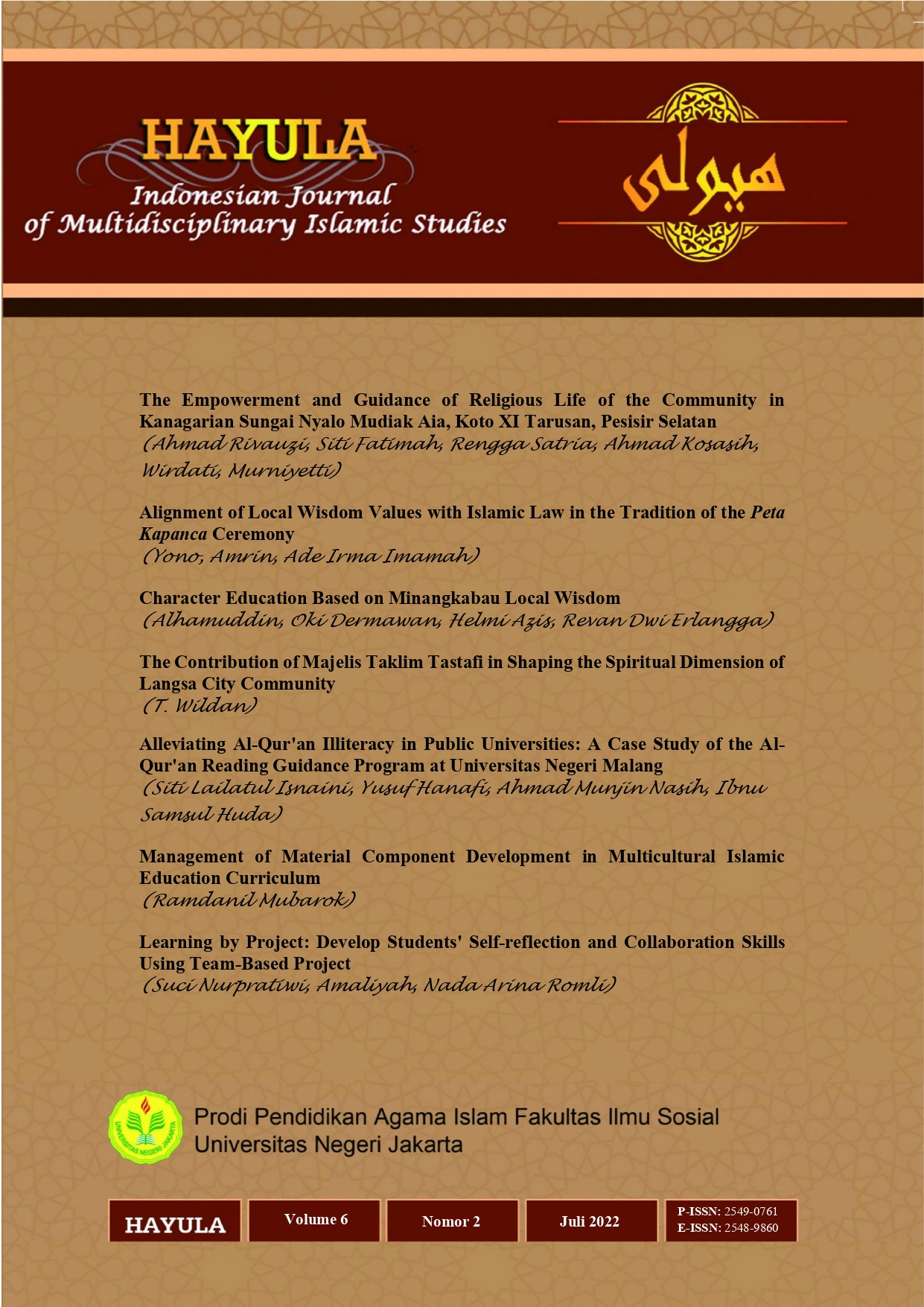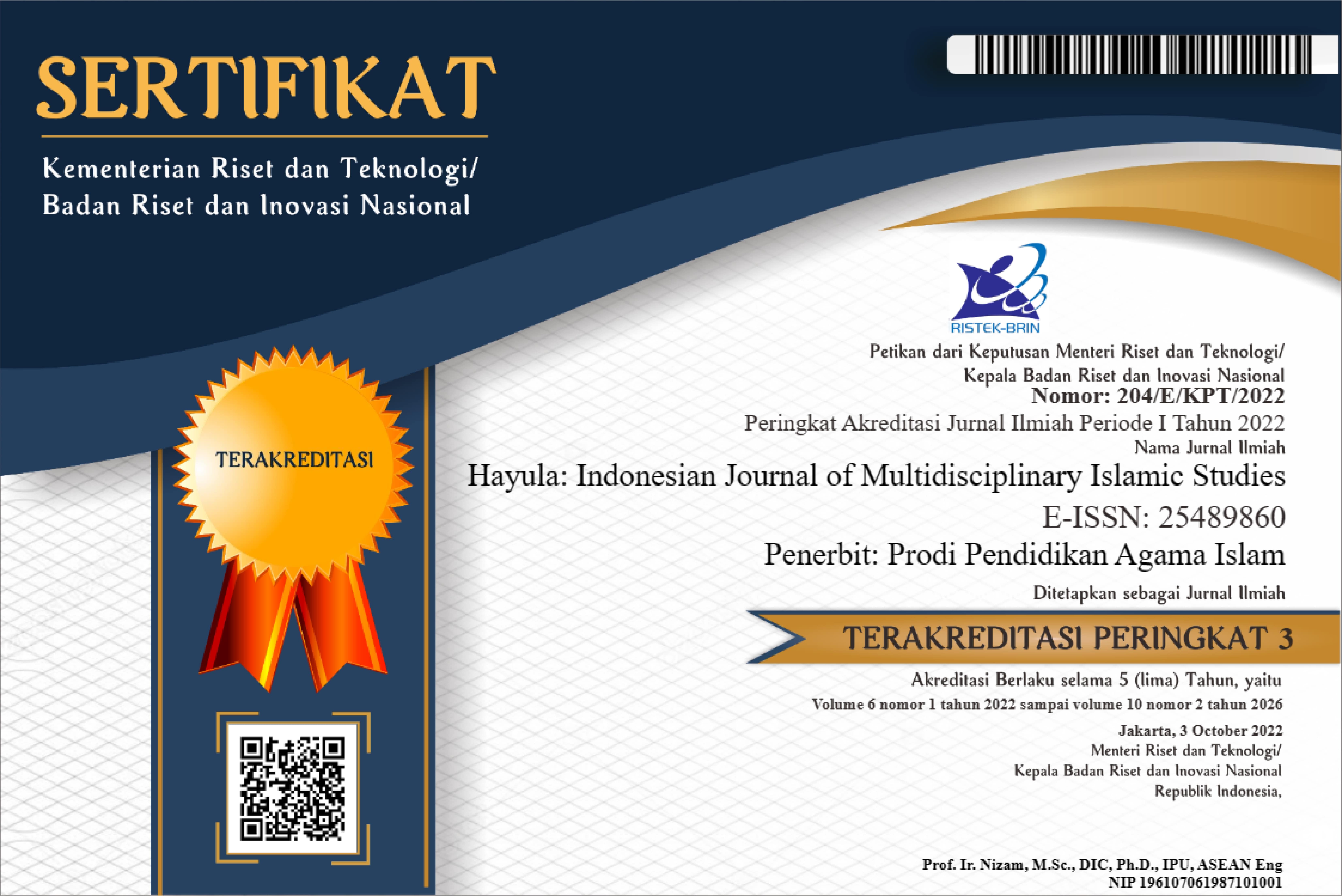The Contribution of Majelis Taklim Tastafi in Shaping the Spiritual Dimension of Langsa City Community
DOI:
https://doi.org/10.21009/hayula.006.02.04Keywords:
majelis, contribution, spiritualAbstract
This study aims to determine the contribution of the majelis taklim Tastafi in shaping the spiritual dimension of the Langsa City community. Participants in the study were 30 members of the majelis taklim Tastafi. The mixed-method approach is used to answer the problem; the quantitative type uses Pearson product-moment, and the qualitative type uses the descriptive-analytical method. The results of the research findings show there is a significant relationship between the activities of the majelis taklim Tastafi in shaping the spiritual dimension of the Langsa City community, indicated by the validity test of the Pearson product-moment correlation data on the activities of the majelis taklim Tastafi and the spiritual dimension, prayer fulfilment
fields 0.959, universality 0.954 and connectedness 0.937. The null hypothesis (H0) is rejected, and the alternative hypothesis (Ha) proposed is accepted; namely, there is a positive relationship and a very significant correlation between attending majlis taklim and the spiritual dimension variables. The higher the routine in attending the majelis taklim, the higher the spiritual dimension and vice versa; this is evidenced by the validity of the data with the results of all values of the spiritual dimension on Sig ( 2-tailed) was 0.000 (p < 0.01). The formation of the spiritual dimension is seen in the practice of worship, belief, relationship with God and humans, and individual responsibilities in life.
Keywords: majelis, contribution, spiritual
References
Aljunied, K. (2021). Islam as therapy: Zakiah Daradjat and the uses of religious-oriented psychology. Indonesia and the Malay World, 49(143). https://doi.org/10.1080/13639811.2021.1873618
Anah, S. (2021). Pondok Pesantren sebagai Wadah Moderasi Islam di Era Generasi Milenial. Jurnal Keislaman, 4(1). https://doi.org/10.54298/jk.v4i1.3273
Autiero, G. (2018). Secular education and religious values in the formation of human capital. International Journal of Development Issues, 17(1). https://doi.org/10.1108/IJDI-06-2017-0103
Creswell, J. W., & Creswell, J. D. (2018). Research Design: Qualitative, Quantitative, and Mixed Methods Approaches - John W. Creswell, J. David Creswell - Google Books. In SAGE Publications, Inc.
Crisp, B. R. (2019). The Spiritual Dimension of Ageing. Australian Social Work. https://doi.org/10.1080/0312407x.2018.1436847
Fahmi Arrauf Nasution, I., Miswari, M., & Sabaruddin, S. (2019). Preserving Identi
through Modernity: Dayah al-Aziziyah and Its Negotiations with Modernity in Aceh. Hayula: Indonesian Journal of Multidisciplinary Islamic Studies, 3(2). https://doi.org/10.21009/hayula.003.2.06
Faizin, T., Hatta, M., & Abdullah, A. (2019). Tastafi Communication Strategy in the Development of Madani Community. Budapest International Research and Critics Institute (BIRCI-Journal) : Humanities and Social Sciences, 2(2). https://doi.org/10.33258/birci.v2i2.260
Frishkopf, M. (2011). Ritual as strategic action: The social logic of musical silence in Canadian Islam. In Muslim Rap, Halal Soaps, and Revolutionary Theater: Artistic Developments in The Muslim World.
Haryanto, S., Chirzin, M., Ilyas, H., & Fauzan, A. (2020). Religious Spiritual Human: Qur’an And Transpersonal Psychology Perspective. International Journal of Advanced Science and Technology, 29(12s).
Helmenstine, A. (2021). Independent and dependent variables examples. In Science Notes.
Kementerian Agama, R. (2022). SIMPENAIS. http://simpenais.kemenag.go.id/majelis
Khosiah, N. (2020). Tradisi Ziarah Wali Dalam Membangun Dimensi Spiritual Masyarakat. Imtiyaz: Jurnal Ilmu Keislaman, 4(1). https://doi.org/10.46773/imtiyaz.v4i1.63
Kurniawati, H., Retnowati, S., Riyono, B., & Widyawati, W. (2019). An exploratory study on the dimensions of spiritual care. Jurnal Kedokteran Dan Kesehatan Indonesia, 10(2). https://doi.org/10.20885/jkki.vol10.iss2.art5
Lehmann, E. L. (1997). Testing statistical hypotheses: The story of a book. Statistical Science, 12(1). https://doi.org/10.1214/ss/1029963261
Moleong, L. J. (2009). Metodologi Penelitian Kualitatif. PT. Remaja Rosda Karya.
Molteni, F. (2021). A need for religion. In International Studies in Sociology and Social Anthropology (Vol. 135).
Mushlihin, Narulita, S., & Aulia, R. N. (2021). Education and New Direction of Islam Nusantara: Towards Humanitarian and Sustainable Development. HAYULA: Indonesian Journal of Mustidisiplinary Islamic Studies, 5(2), 171–188.
Olyanasab, S. Z., & Shahandeh, A. (2019). Investigating the Effect of Reciting the Quran and Listening to it on the Dimensions of Spiritual Well-Being of Payame Noor University Students. Journal of Research on Religion & Health, 4(5).
Pattison, S. (2019). Why we need religion. Practical Theology, 12(2). https://doi.org/10.1080/1756073x.2019.1600115
Piedmont, R. L. (1999). Does Spirituality Represent the Sixth Factor of Personality?
Spiritual Transcendence and the Five-Factor Model. Journal of Personality, 67(6). https://doi.org/10.1111/1467-6494.00080
Piedmont, R. L. (2004a). Spiritual transcendence as a predictor of psychosocial outcome from an outpatient substance abuse program. Psychology of Addictive Behaviors, 18(3). https://doi.org/10.1037/0893-164X.18.3.213
Piedmont, R. L. (2004b). The Logoplex as a paradigm for understanding spiritual transcendence. Research in the Social Scientific Study of Religion, 15(1).
Piedmont, R. L. (2013). A short history of the Psychology of Religion and Spirituality: Providing growth and meaning for Division 36. Psychology of Religion and Spirituality, 5(1). https://doi.org/10.1037/a0030878
Piedmont, R. L., Ciarrochi, J. W., Dy-Liacco, G. S., & Williams, J. E. G. (2009). The Empirical and Conceptual Value of the Spiritual Transcendence and Religious Involvement Scales for Personality Research. Psychology of Religion and Spirituality, 1(3). https://doi.org/10.1037/a0015883
Ridwan, & Sanusi, G. (2019). Dimensi Spiritual dalam Hukum : Mengartikulasi Nilai Spiritual dalam Bangunan Pemikiran Hukum Mainstream. Prosiding Seminar Nasional : Pengembangan Epistemologi Ilmu Hukum, 1(1), 471–488.
Russo, R. (2021). The Pearson product-moment correlation coefficient r. In Statistics for the Behavioural Sciences. https://doi.org/10.4324/9780203641576-23
Sudigdo, & Sahal Abidin. (2022). Peran dan Kontribusi Majelis Ta’lim terhadap Peningkatan Religiusitas Masyarakat di Perumahan Jiwan 002/006, Ngemplak, Kartasura. Academia: Jurnal Ilmu Sosial Dan Humaniora, 1(2). https://doi.org/10.54622/academia.v1i2.24
Sugiyono. (2013). Metode Penelitian Kombinasi (Mixed Methods). Alfabeta.
Sunardin. (2021). Manusia Membutuhkan Agama di Masyarakat. Jurnal Kajian Islam Dan Masyarakat, 4(1).
Tastafi, T. (2019). Profil Majelis Taklim Tastafi. Markaz Al-Ishlah.
Zulfikar, Saiful Bahri, Muslem, Fatahillah, Amiruddin, & Muhibuttibri. (2020). The Da’wah Movement of Ulama Dayah (Analysis the Da’wah Movement of Têungkū Hasanoel Bashry). Britain International of Humanities and Social Sciences (BIoHS) Journal, 2(1). https://doi.org/10.33258/biohs.v2i1.146
Interview
Interview, Marzuki, Desember, 2021
Interview, Ilham Suhendra, Desember, 2021
Interview, Bayu Setiawan, Desember, 2022
Interview, Cut Aminah, Desember, 2022
Interview, Muhammad, Desember, 2022
Interview, Zainal Mutaqien, Desember, 2022
Interview, Husna Al-Hasnah Hanum, Desember, 2022
Interview, Siti Fatanah, Desember, 2022
Interview, Rukiyah, Desember, 2022
Downloads
Published
How to Cite
Issue
Section
License
Authors who publish with this Journal agree to the following terms:
- Author retain copyright and grant the journal right of first publication with the work simultaneously licensed under a creative commons attribution licensethat allow others to share the work within an acknowledgement of the work’s authorship and initial publication of this journal.
- Authors are able to enter into separate, additional contractual arrangementfor the non-exclusive distribution of the journal’s published version of the work (e.g. acknowledgement of its initial publication in this journal).
- Authors are permitted and encouraged to post their work online(e.g. in institutional repositories or on their websites) prior to and during the submission process, as it can lead to productive exchanges, as well as earlier and greater citation of published works.
Users/public use of this website will be licensed to CC BY







